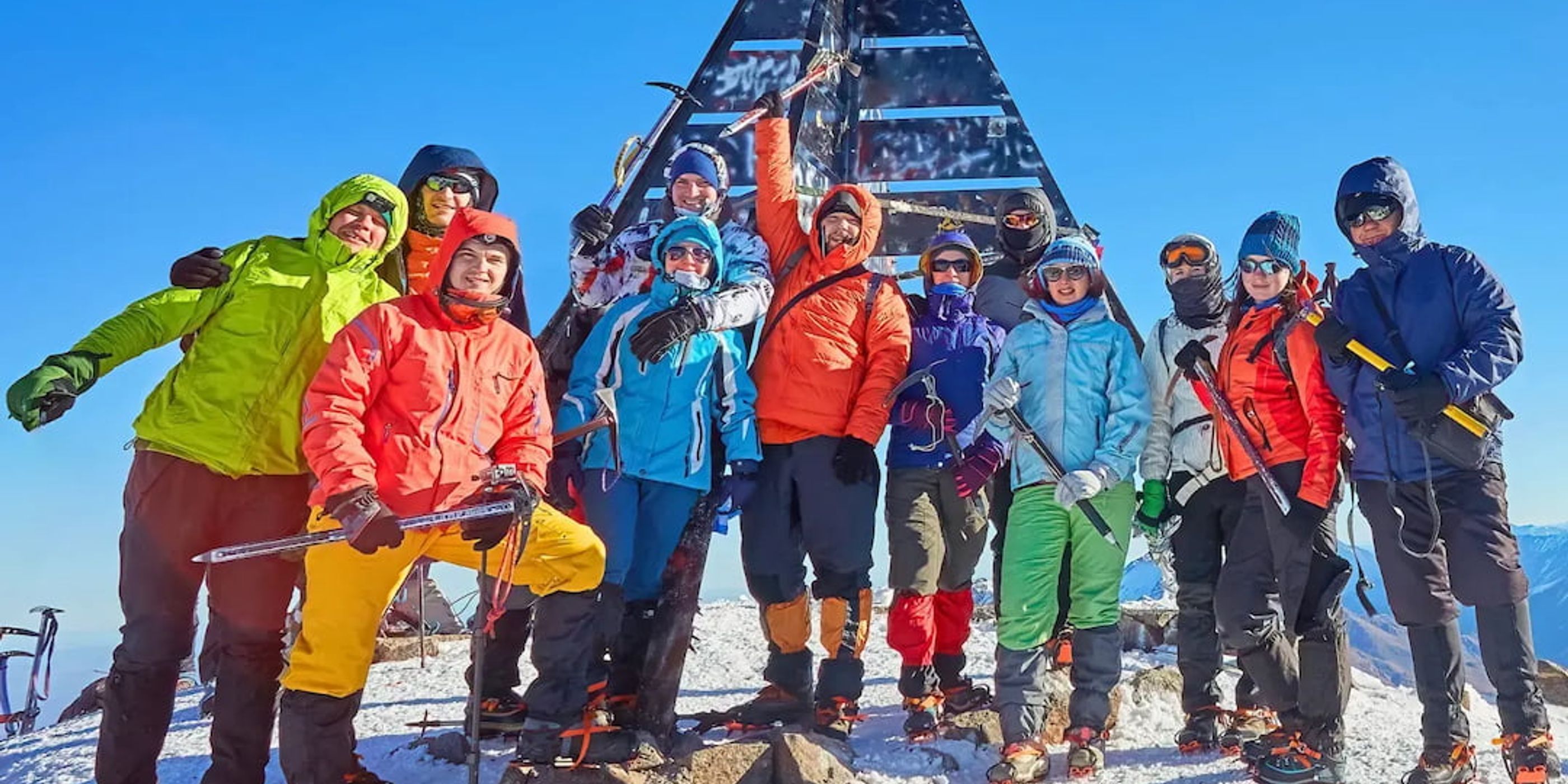
Mount Toubkal Difficulty: Tips, Tricks & What to Expect
Climbing Mount Toubkal is right up there on many a would-be adventurer's bucket list. And we totally get why. Not only is Mount Toubkal North Africa's highest peak, it's slap bang in the heart of the stunning Atlas Mountains.
Whether you’re a seasoned hiker or never climbed a hill before, read on to know what to expect before you attempt your own Mount Toubkal ascent.
But should you worry about Mount Toubkal difficulty? Let's get into it!
How Hard Is It?
An ascent of Mount Toubkal is considered a moderate to challenging hike.
You won't need technical climbing skills, but you will need a good basic level of physical fitness and you'll probably need to train a bit to improve your endurance before you go.
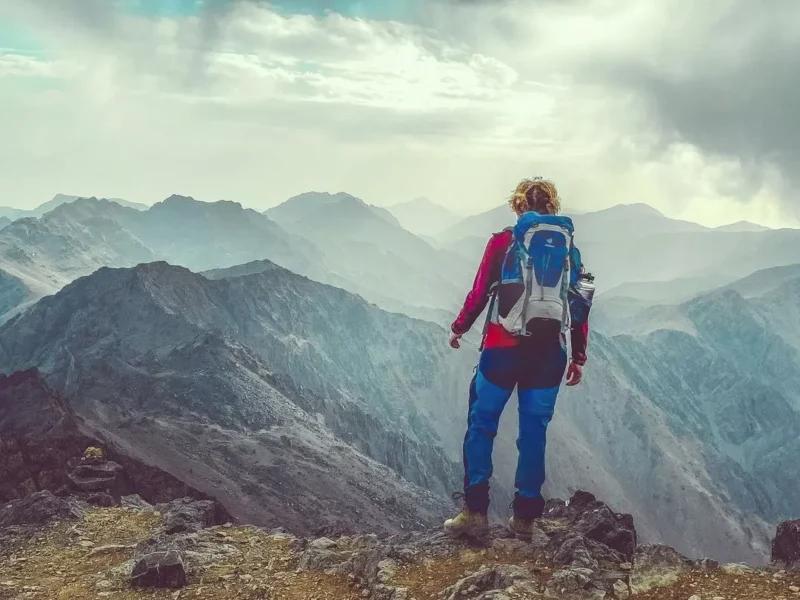
Climbing Mount Toubkal involves a long, sustained trek through rocks and scree, which can be challenging.
Whatever time of year you decide to climb, having the right gear and preparing yourself is the key to ticking this bad boy off the list.
Let’s get into what makes Mount Toubkal a challenging but rewarding trek.
The numbers:
- The first day of trekking from Imlil (1,740m) to the refuge (3,200m) is roughly 10–12km with 1,400–1,500m of ascent (about 5–6 hours).
- Summit day adds about 960m of ascent and a big descent back to Imlil so expect 8–12 hours on your feet.
The Altitude Challenge: Altitude Sickness
We've all heard of altitude sickness. At worst, it can develop into High Altitude Pulmonary Oedema or High Altitude Cerebral Oedema, which can be deadly.
At 4,167m, acute mountain sickness (AMS) is possible—especially on rapid ascents. Most trekkers do fine with sensible pacing and a night at the refuge, but you should know the symptoms and be ready to pause or descend.
However, there is always a remote possibility and guides are trained to watch for any potential symptoms.
There are a few things you can do to reduce the risk;
- Acclimatisation: Acclimatisation: Sleep a night in Imlil (1,740m) and a night at the refuge (3,200m) before summit day to give your body time to adjust.
- Hydration: Aim for 2–3 litres per day (more like 3L in summer). Refill at the refuge and use purification tablets or a filter.
- Pace Yourself: Go slowly to give your body ample time to get used to the thinning air.
- Medication: Some trekkers carry acetazolamide to help prevent AMS—speak to a travel health clinic to see if it’s right for you.
Most people feel fine or get only mild symptoms. If you develop a persistent headache, nausea, or unsteady walking, stop ascending; if symptoms don’t improve at rest, descend and tell your guide.
Want total peace of mind?
When you climb Mount Toubkal with us, our guides are fully trained to watch out for any symptoms of altitude sickness.
Or maybe you fancy a Mount Toubkal Winter Trek?
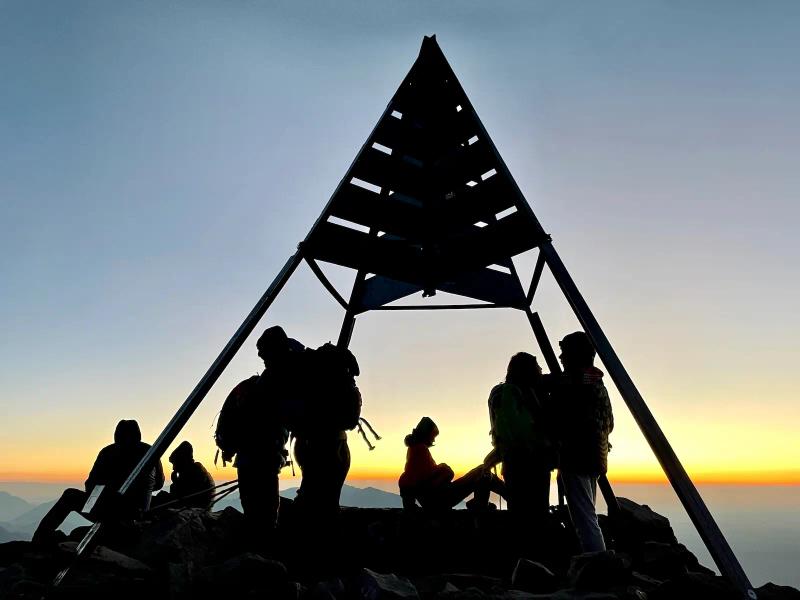
How to Climb Mount Toubkal
Climbing Mount Toubkal is an epic achievement, but you'll need to prepare yourself for physical and mental challenges.
While climbing Mount Toubkal isn't technical, don’t underestimate it - on summit day you'll be trekking for several hours over steep and rocky terrain.
Training Tips:
- Think Cardio: running, cycling or hiking with hills 30–60 minutes, 3–4 times a week. Mix one longer session at an easy pace with one hill or interval session.
- Strength Training: you'll need to focus on exercises that strengthen your legs and core muscles. Squats, lunges and calf raises are all great.
- Endurance Training: Include some long walks. Gradually increase the distance and get used to carrying a backpack. Include some hills and rougher terrain in your long walks.
- Flexibility: we know, we know, nobody likes stretching, but it may help prevent injuries. Stretch before and after your workouts for the best results. Trust us.
- Speak to your GP: If you have any worries or pre-existing health issues it’s a good idea to get the go-ahead.
The fitter you are, the more you’ll enjoy the climb and that stunning scenery!
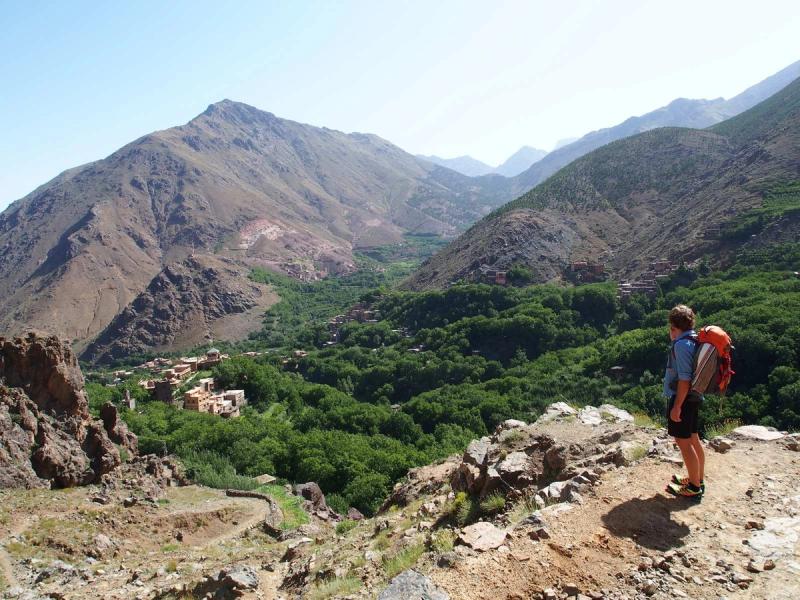
Time Commitment
Consider how much time you have available when planning to climb Toubkal.
Whilst the most popular itinerary is a 4-day trip, you'll usually only be trekking for 2 days, with the other 2 being transfers.
On the first day of trekking, you'll start from Imlil and head up to the refuge.
On the second you'll start early for a summit attempt before coming back to Imlil.
If you're going for a winter ascent, you could allow an extra day as a contingency for bad weather but it's not usually required.
Essential Gear
The right gear can make or break your trip. Here’s rough guide to what to take to climb Mount Toubkal:
For Summer Climbs:
- Breathable Clothing: Lightweight, moisture-wicking materials will help keep you cool.
- Hiking Boots: Well broken in and with good ankle support.
- Daypack: For carrying water, snacks and first aid kit, plus warmer layers and waterproofs.
- Sun Protection: Hat, sunglasses and high SPF sunscreen to protect from the summer heat.
- Hydration: Carry at least 2 litres of water and purification tablets.
- Trekking poles will protect your joints
For Winter Climbs:
- Insulated Clothing: Dress in layers - warm hiking socks, thermal base layer and a down jacket.
- Crampons and Ice Axe: Must have for icy terrain - these are included in our Mount Toubkal Winter Trek. You don't need any experience for this trip and your guide will show you exactly how to use them.
- Winter Boots: Must be able to fit a step-in crampon.
- Gloves and Hat: It can be up to -10 at the summit.
- Emergency Gear: Basic first aid kit, whistle and head torch.
- Helmet (optional but recommended): Useful for icy conditions or loose rock above the refuge.
Insurance: Make sure your travel insurance covers trekking to 4,167m and winter equipment if you’re going in snowy conditions.
We recommend Rise and Shield
Fancy climbing Mount Toubkal with Call to Adventure?
Climbing Mount Toubkal: Why Do I Need A Guide?
As of 2025, trekking with a licensed local guide is required on Toubkal and enforced at on‑route checkpoints.
Benefits of using a Guide:
- Safety: Guides are trained to deal with emergencies and know the mountains like the back of their hand.
- Logistics: From permits to meals - everything's taken care of so you can focus on those views.
- Cultural Knowledge: Local guides will give you a great insight into Moroccan culture and the environment.
- Equipment: You can hire this cheaply from the guide. Crampons and ice axe are included in our Mount Toubkal Winter Trek.
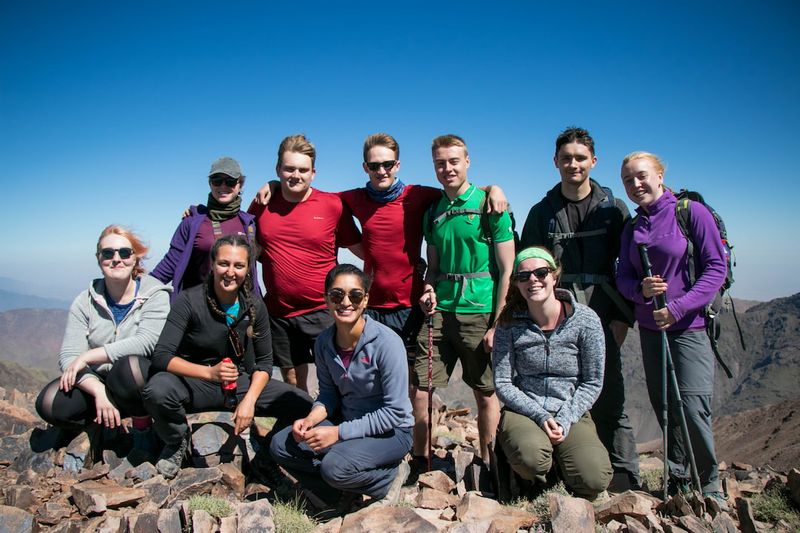
What to Expect During your Mount Toubkal Trek
Day 1 - transfer to Imlil
We’ll pick you up from Marrakesh Airport and whisk you off to the Berber village of Imlil, where we’ll spend the night in a lodge.
If you land early you'll have time to explore Marrakech. We do two pick ups from the airport, one at 11am and the other at 3pm. Or we can offer a custom pick up for a £10 supplement.
Enjoy your first views of the surrounding Atlas Mountains over dinner.
Day 2 - trek to Refuge du Toubkal
The adventure begins! We’ll follow the Mizane Valley pass the village of Aroumd, then climb steadily to the pilgrimage shrine of Sidi Charamouch. You need to try the fresh orange juice from one of the stalls!
From here the trail climbs gradually, zigzagging up to the snowline and the Mount Toubkal Refuge at 3,206m. This is our base camp - we’ll stay in the hut (or camp if needed) overnight for our ascent tomorrow.
Day 3 - Jebel Toubkal Summit day
This is the big one!
After a hearty breakfast, we’ll get an early start for our ascent of Mount Toubkal, the highest peak in North Africa! Our route takes us up the South Cirque, crossing the stream above the refuge. Although the walking is relatively easy, the scree and the altitude can make it feel quite hard work, but we promise, the views from the top will be worth it!
Once we reach the 4,167m summit you’ll be blown away by the views. We’ll be able to see the Marrakesh Plain and the High Atlas mountains in the north, and, if we’re lucky, as far as the Anti-Atlas and the Sahara Desert.
After a few summit selfies and taking in those incredible views we’ll retrace our steps back down the mountain and down to Imlil, passing back through Sidi Charamouch.
Back in Imlil we’ll transfer to Marrakesh where we’ll stay the night in a basic but comfortable riad.
Day 4 - transfer to the airport and home
We’ll transfer you back to the airport (or the city centre if you prefer) for a sad goodbye after an amazing adventure.
You in?
Conquering Mount Toubkal is more than a trek; it’s a Moroccan adventure you'll remember for years to come.
Are you ready to tackle the highest mountain in North Africa and have the adventure of a lifetime?
Secure your spot on our Mount Toubkal Trek
Or our Mont Toubkal Winter Trek
About the Author

George Beesley
Adventure Lover & Founder of Call To Adventure
George just bloody loves a bit of adventure! Imagine someone who not only hikes up mountains for breakfast but also bikes across continents. Got a case of wanderlust? This guy's been to over 50 countries and comes back with stories that'll make your grandma want to go bungee jumping.

![Climb Mount Toubkal Tips From Local Expert [30 Years Experience]](https://cdn.sanity.io/images/f5ovd1ei/production/583602f19db9ccc67b832053ccba8ca25e090833-1660x1067.webp?w=80&h=80&fit=crop&auto=format)
